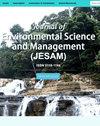Long-term Environmental Performance of Stormwater Biofiltration Sorption Media in Sustainable Drainage Systems (SuDS)
IF 0.3
4区 环境科学与生态学
Q4 ENVIRONMENTAL SCIENCES
引用次数: 0
Abstract
In this climate impacted world, there is an increasing need for countries facing potential water extremes to improve the reuse potential of grey water and storm water. By implementing best management practices for the treatment of stormwater and urban run-off, contaminants can be removed, and the water recycled and reused. The effectiveness of stormwater treatment is impacted by the clogging of equipment or where contaminant storage exceeds performance design. Poorly or untreated stormwater runoff can impact the environment through the release of total dissolved solids (TDS), suspended solids (turbidity), phosphate, ammonia, and elevated chemical and biochemical oxygen demand (COD and BOD, respectively). This study evaluated the hydraulic and environmental performance of gravity flow stormwater filters over a three-year period with the average filter life cycle four months. Six bespoke gravity stormwater filters employing sorbent pillows, and including peat moss, were tested for their effectiveness, including for nitrite and nitrate. An improvement in water quality of 80-98% was recorded. Oil and grease were managed effectively (peat moss and sorbent pillows reduced BOD, COD, color, and turbidity) but not significantly when compared to conventional filter media. The findings demonstrate that stormwater biofilters can be an innovative, low-cost, and sustainable solution for both urban and sub-urban runoff management, addressing water quality and resource quantity challenges.可持续排水系统(SuDS)中雨水生物过滤吸附介质的长期环境性能
在这个受气候影响的世界里,面临潜在极端用水的国家越来越需要提高灰水和雨水的再利用潜力。通过实施雨水和城市径流处理的最佳管理实践,可以去除污染物,并对水进行回收和再利用。雨水处理的有效性受到设备堵塞或污染物储存超过性能设计的影响。不良或未经处理的雨水径流会通过释放总溶解固体(TDS)、悬浮固体(浊度)、磷酸盐、氨以及化学和生化需氧量(分别为COD和BOD)升高来影响环境。本研究评估了重力流雨水过滤器在三年内的水力和环境性能,过滤器的平均寿命为四个月。测试了六种采用吸附垫的定制重力式雨水过滤器的有效性,包括对亚硝酸盐和硝酸盐的有效性。水质改善了80-98%。油和油脂得到了有效的管理(泥炭苔和吸附垫降低了BOD、COD、颜色和浊度),但与传统过滤介质相比,效果并不显著。研究结果表明,雨水生物过滤器可以成为城市和次城市径流管理的创新、低成本和可持续的解决方案,解决水质和资源量方面的挑战。
本文章由计算机程序翻译,如有差异,请以英文原文为准。
求助全文
约1分钟内获得全文
求助全文
来源期刊

Journal of Environmental Science and Management
ENVIRONMENTAL SCIENCES-
CiteScore
0.90
自引率
0.00%
发文量
10
审稿时长
2 months
期刊介绍:
The Journal of Environmental Science and Management (JESAM) is an international scientific journal produced semi-annually by the University of the Philippines Los Baños (UPLB).
JESAM gives particular premium to manuscript submissions that employ integrated methods resulting to analyses that provide new insights in environmental science, particularly in the areas of:
environmental planning and management;
protected areas development, planning, and management;
community-based resources management;
environmental chemistry and toxicology;
environmental restoration;
social theory and environment; and
environmental security and management.
 求助内容:
求助内容: 应助结果提醒方式:
应助结果提醒方式:


